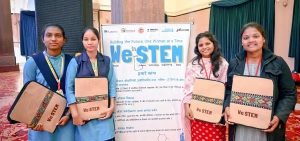GS2 – Vulnerable Sections

Context
Despite high academic participation, Indian women continue to face systemic exclusion from careers in Science, Technology, Engineering, and Mathematics (STEM).
The STEM Paradox in India:
- Academic Success, Workforce Disparity:
Women constitute 43% of STEM graduates, the highest globally among major economies, but make up only 27% of the STEM workforce. - Labour Force Participation:
As per PLFS 2023–24:- National Female LFPR: 41.7%
- Rural Women: 47.6%
- Urban Women: 25.4%
- Leaky Pipeline Issue:
Women exit STEM careers at various stages due to:- Workplace hostility
- Gender norms
- Caregiving responsibilities
Why Gender Inclusion in STEM Matters:
- Economic Potential:
- McKinsey: Gender parity could add $700 billion to India’s GDP by 2025.
- World Bank: 50% female workforce could raise GDP growth by 1%.
- Innovation and Diversity:
Diverse teams lead to creative, inclusive problem-solving. - Social Justice:
Women in STEM serve as role models and break career stereotypes.
Key Challenges for Women in STEM:
- Cultural Barriers:
Gender stereotypes and traditional norms dissuade girls from choosing STEM fields. - Workplace Inequities:
Absence of gender-sensitive policies, mentorship, and safety mechanisms. - Limited Exposure:
Rural girls lack access to role models and awareness of STEM opportunities. - Mismatch in Skills and Jobs:
Many women earn degrees but struggle with industry alignment and job access.
Government Initiatives:
- NEP 2020:
Encourages gender inclusion, hands-on learning, and career readiness. - Gender Budgeting:
Share of gender budget in the national budget increased to 8.8% (₹4.49 lakh crore) in 2025–26. - Beti Bachao, Beti Padhao:
National campaign to empower girls through education, including STEM fields. - Skill India Mission:
Promotes technical training for women in emerging tech sectors. - Digital India:
Boosts digital literacy, innovation, and women’s tech entrepreneurship. - STEM Scholarships:
Schemes like Vigyan Jyoti and KIRAN promote women researchers.
Way Forward:
- Strengthen Industry-Academia Linkages
- Promote Gender-Sensitive Work Environments
- Expand Mentorship Networks
- Enhance STEM Career Awareness in Rural Areas
- Support Re-skilling and Returnship Programmes




